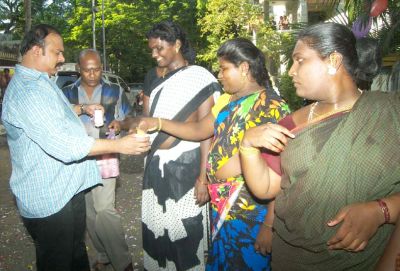|
|
| Help | |
| You are here: Rediff Home » India » News » First Look |
|
 In India, Tamil Nadu leads the way in HIV awareness and immunization. Now, the state government has set up a welfare board for transgenders -- the first of its kind in India.
In India, Tamil Nadu leads the way in HIV awareness and immunization. Now, the state government has set up a welfare board for transgenders -- the first of its kind in India. The board, which will meet for the first time on May 26, has been given a seed fund of 50 lakh. The aspect that stands out is that six of the board members are transgenders, appointed from across Tamil Nadu. State Social Welfare Minister Poongothai Aladi Aruna will Chair the board.
AJ Hariharan [Images] is the founder of the Indian Community Welfare Organisation, a non-profit organisation working with sex workers in Chennai over the last 12 years.
"The first thing to do is to conduct a census. No one actually knows how many they are because of their nomadic habits. Then we have to study their living patterns and the power structure of their society. They have a Guru-Chela system of family," says Hariharan when asked about the purpose of the board.
"We have to work with their power structure. We must make them feel that we are there to help them, not improve them," he explains, adding that local units will be set up to deal with local grievances.
"There are many who hide the fact that they are transgenders and work in society. The board is thinking of ways to help them too," he says.
An enumeration during the annual Coovagam festival will yield a higher count, feel officials.
There are three types of transgenders -- Nirvan Kothi, who have been operated upon; Aqua Kothi, who have not undergone sex change operations; and cross-dressers.
Rights issues that have to be dealt with -- the way they are treated by thugs, cops and their clients. Transgenders normally stay in groups. Twenty of them will stay with one who has a house. They share their homes readily with their own kind. Housing has to be provided.
Recognition is another issue. They must have their own toilets; when they buy a railways ticket they must be allowed to write transgender in the sex column; they also need passports, voter ID and ration cards.
Transgender Welfare Board Director Manivasan told rediff.com, "This is unique. We are the first state to recognize these marginalized people. It is a physical handicap and nothing else."
"We are first going to tackle general issue faced by all marginalized people -- education, health and housing. This will be done after the enumeration. We are planning a transit home where they can stay temporarily and also meet to discuss their problems. We are also planning to start self-help groups among them. It has succeeded with other poor people and will help them too," he added.
Reportage: A Ganesh Nadar | Photograph Courtesy: ICWO
|
|
| © 2008 Rediff.com India Limited. All Rights Reserved. Disclaimer | Feedback |